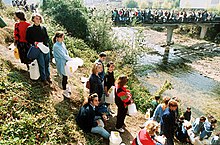
Back سياسة مائية Arabic জলের রাজনীতি Bengali/Bangla Políticas sobre el agua Spanish سیاست آب Persian Géopolitique de l'eau French Politik air ID Política da água Portuguese Water politics SIMPLE

Water politics, sometimes called hydropolitics, is politics affected by the availability of water and water resources, a necessity for all life forms and human development.
Arun P. Elhance's definition of hydropolitics is "the systematic study of conflict and cooperation between states over water resources that transcend international borders".[1] Mollinga, P. P. classifies water politics into four categories, "the everyday politics of water resources management", "the politics of water policy in the context of sovereign states", "inter-state hydropolitics" and "the global politics of water".[2] The availability of drinking water per capita is inadequate and shrinking worldwide.[3] The causes, related to both quantity and quality, are many and varied; they include local scarcity, limited availability and population pressures,[4] but also human activities of mass consumption, misuse, environmental degradation and water pollution, as well as climate change.
Water is a strategic natural resource, and scarcity of potable water is a frequent contributor to political conflicts throughout the world. With decreasing availability and increasing demand for water, some have predicted that clean water will become the "next oil"; making countries like Canada, Chile, Norway, Colombia and Peru, with this resource in abundance, the water-rich countries in the world.[5][6][7] The UN World Water Development Report (WWDR, 2003) from the World Water Assessment Program indicates that, in the next 20 years, the quantity of water available to everyone is predicted to decrease by 30%. Currently, 40% of the world's inhabitants have insufficient fresh water for minimal hygiene. More than 2.2 million people died in 2000 from diseases related to the consumption of contaminated water or drought. In 2004, the UK charity WaterAid reported that a child dies every 15 seconds from easily preventable water-related diseases; often this means lack of sewage disposal; see toilet. The United Nations Development Program sums up world water distribution in the 2006 development report: "One part of the world, sustains a designer bottled water market that generates no tangible health benefits, another part suffers acute public health risks because people have to drink water from drains or from lakes and rivers."[8] Fresh water—now more precious than ever in our history for its extensive use in agriculture, high-tech manufacturing, and energy production—is increasingly receiving attention as a resource requiring better management and sustainable use.
Riparian water rights have become issues of international diplomacy, in addition to domestic and regional water rights and politics.[9] World Bank Vice President Ismail Serageldin predicted, "Many of the wars of the 20th century were about oil, but wars of the 21st century will be over water unless we change the way we manage water."[10][11] This is debated by some, however, who argue that disputes over water usually are resolved by diplomacy and do not turn into wars.[12] Another new school of thought argues that "perceived fears of losing control over shared water might contribute towards a constant preparedness to go to war among riparian nations, just in case there is one".[13]
- ^ Arun P. Elhance (1999). Hydropolitics in the 3rd World: Conflict and cooperation in International River Basins. Washington, DC: US Institute of Peace Press. p. 3.
- ^ Mollinga, P. P., 2008. " Water, politics and development: Framing a political sociology of water resources management." Water alternatives, 1(1), 7., 12
- ^ "World's supply of fresh water shrinking dramatically: report". CBC News. March 5, 2003. Archived from the original on July 3, 2007.
- ^ "The Coming Wars for Water". Report Syndication. October 12, 2019.
- ^ "Total Renewable Fresh Water Supply By Country" (PDF). Archived from the original (PDF) on 2008-05-16. Retrieved 2008-04-18.
- ^ Peter Lawrence et al. "The Water Poverty Index : an International Comparison", Keele Economics Research Papers, 2002
- ^ A Chronology of Water-Related Conflicts
- ^ UNDP Human Development Report 2006 United Nations Development Programme, 2006.
- ^ Rahaman, M. M. (Ed.) (2012) Special Issue: Water Wars in 21st Century along International Rivers Basins: Speculation or Reality?, International Journal of Sustainable Society, Vol. 4, Nos. 1/2, 193 pages.
- ^ Serageldin, I. (2009) 'Water: conflicts set to arise within as well as between states', Nature, Vol. 459, p.163.
- ^ Where Oil and Water Do Mix: Environmental Scarcity and Future Conflict in the Middle East and North Africa
- ^ Barnaby, W., 2009. "Do nations go to war over water?" Nature, Vol. 458, 282–283
- ^ Rahaman, M.M. (2012) Water Wars in 21st Century: Speculation or Reality?, International Journal of Sustainable Society, Vol. 4, Nos. 1/2, pp. 3–10. DOI:10.1504/IJSSOC.2012.044658